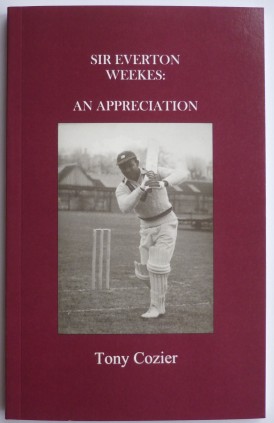Everton Weekes: An Appreciation
Martin Chandler |Published: 2017
Pages: 50
Author: Cozier, Tony
Publisher: J W McKenzie Ltd
Rating: 4 stars

If you had no restrictions, which five people would you invite round to dinner? It’s a game everyone has played, and indeed a question I’ve seen debated on more than one internet forum, ours included. For all sorts of reasons the late Tony Cozier would be very close to the top of my list.
My earliest memory of Cozier, and probably the abiding one, is that wonderful voice. As a child those mellifluous tones always meant we were enjoying a West Indian summer. In my childhood that meant my first cricket hero, Garry Sobers. Later it meant those remarkable sides who ruled the game from the mid 1970s onwards, until the sad decline of the 1990s and early noughties set in.
It was an instantly recognisable voice, Caribbean to the core. There was a joy in almost everything Cozier said, and his passion for the game was obvious. He could be humorous. He could be critical. At times what he said, especially latterly, carried a hint of despair, but he was never less than interesting, and rarely proved wrong.
It is disappointing that there are not more books on the game by Cozier on my shelves. That is not to say he was not a prolific writer. I have many brochures that he edited, and have read many articles that he wrote, but he never wrote a full biography of anyone, nor sadly an autobiography. He should have done. His knowledge of West Indies cricket was encyclopaedic, and he was known to and respected by everyone involved in the game.
Everton Weekes is in his 93rd year, and is the only West Indian alive who played Test cricket in the 1940s. He is one of the few batsmen who is an all time great in anyone’s currency, and despite the inexorable march of Anno Domini he remains in good health and, as Cozier found whilst working on this appreciation, his memory is as sharp as ever.
The subject matter of this essay is not in itself particularly ambitious. It amounts to a biographical sketch in the context of the history of Caribbean cricket over the ten year period in which Weekes represented West Indies. The story is a familiar one. I have heard it told and read about it many times, but there remains much that is compelling in Cozier’s account.
Part of the appeal lies in the insights provided by Weekes. These are only occasional, and in no way dominate the story, but are always valuable. Of most importance however are the observations that come only from Cozier’s depth of knowledge. Two are particularly thought provoking, their source being Cozier’s father, who I have to confess I had no idea was a journalist until Tony’s obituarists swung into action last May.
Jimmy Cozier was the only writer from the Caribbean who accompanied the famous 1950 tourists. As his son’s narrative explains England had not expected to be unduly stretched by the tourists, and a convincing win in the first Test served only to boost confidence further. As the tour progressed however West Indies extended their dominance over the counties into the Tests and they won the remaining three Tests in great style. By the time my interest in the game’s history had flowered everything I read accorded that West Indian side the respect that they so clearly deserve, so much so it never occurred to me that it would ever have been different. I now know it was however, Jimmy at one point feeling compelled to write “never have I read stories day after day which see so little merit in the men who are actually winning the game”.
Their overwhelming success in England meant that the Australians were desperate to meet the men from the Caribbean to decide which of the two was the best in the world. The only previous series between the countries had been in Australia twenty years previously. Unsurprisingly given commercial considerations the 1951/52 series took place in Australia as well. It was a disappointing one that Australia won easily enough by four Tests to one, albeit not quite as convincingly as that scoreline suggests, but Cozier recalls his father telling him of a conversation he had had with former Australian Test batsman Alan Kippax, “in Australia, you’ll be murdered, make them come to you and you’ll win for sure”.
What would have happened if the series had been played in the Caribbean in 1951/52? The pitches wouldn’t have been designed for Keith Miller, Ray Lindwall and Bill Johnston. They would have been tailor made for Sonny Ramadhin and Alf Valentine, and Weekes, Clyde Walcott, Frank Worrell, Jeff Stollmeyer and Allan Rae would have been batting on familiar surfaces. Perhaps the outcome would have been very different, given that it was the successes of Miller, Lindwall and Johnston that were decisive in Australia – but then three years later when Australia finally did make the return trip they still dominated – what we don’t know is whether Jimmy Cozier and Kippax ever revisited their earlier conversation.
All in all Sir Everton Weekes: An Appreciation is a fitting tribute to both author and subject. It has been published by book dealer John McKenzie. There is a choice of a paperback edition, as per the accompanying illustration, or an individually numbered cloth bound limited edition of 125 copies bearing the signatures of author and subject on the limitation page. The paperback is £20, the limited edition £100, with the exception of the first 25 copies, bound in half calf, which retail at £175.






Leave a comment